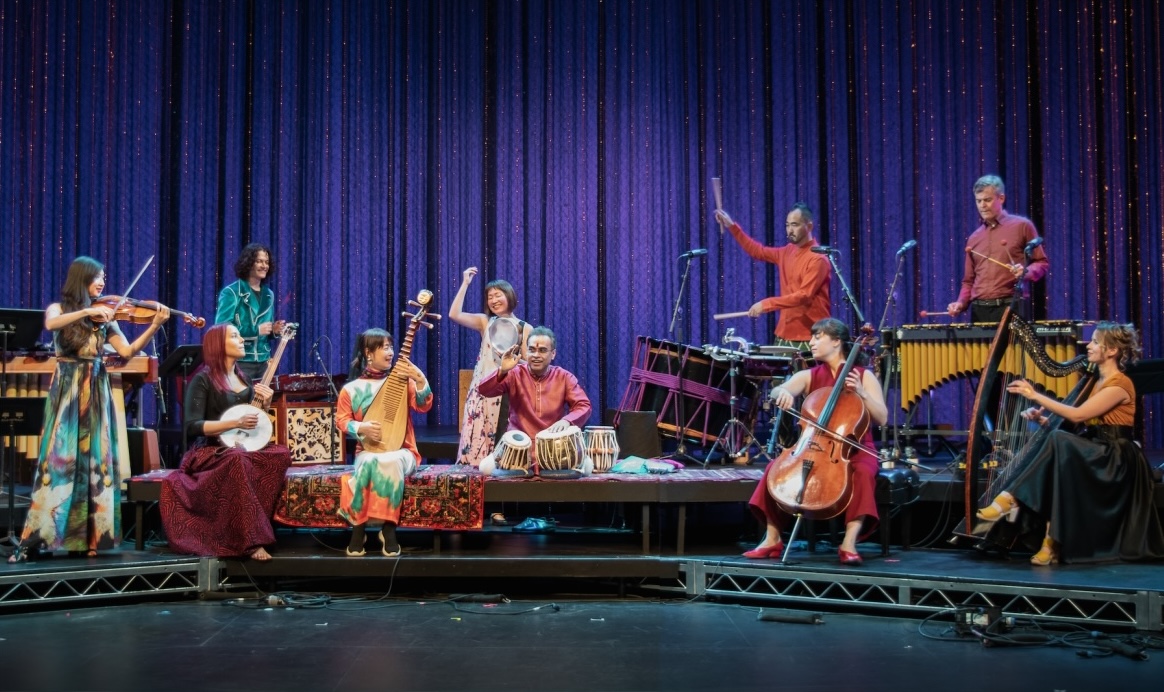New music dedicated to and inspired by the many unsung people who built America’s railroads is the focus of the Silkroad Ensemble’s ambitious multicultural production coming to the Bay Area this week.
“A musical journey of reclamation” is how Pulitzer Prize- and Grammy-winning, singer, composer and multi-instrumentalist Rhiannon Giddens describes “American Railroad,” the concert that recognizes the Indigenous, African American, Irish, Chinese, Japanese and other immigrants whose hard labor made the Transcontinental Railroad possible.
“The ‘American Railroad’ project has been years in the making, and the program we’ve created for our first tour is only the beginning. In it, we shed light on those who have been erased or overlooked throughout American history and merge with it Silkroad’s unique ability to amplify voices from a multitude of backgrounds and cultures,” says Giddens, artistic director of Silkroad, the nonprofit musical organization founded in 1998 by Yo-Yo Ma with a mission to improve the world through musical and cultural collaboration.

With the goal of “righting wrongs” and “painting a more accurate picture of the global diasporic origin of the American Empire,” “American Railroad” — in Stanford on Wednesday, Davis on Thursday, Berkeley on Friday and Rohnert Park on Saturday — includes commissions by jazz vocalist Cécile McLorin Salvant; Oglala Lakota and visual artist Suzanne Kite; and Wu Man, a Silkroad Ensemble member and virtuoso on pipa, a traditional string instrument sometimes called the Chinese lute.
Other Silkroad Ensemble musicians in the lineup are: Giddens (banjo and vocals); Mazz Swift (violin and vocals); Sandeep Das (tabla); Haruka Fujii (percussion); Shawn Conley (bass); Karen Ouzounian (cello and vocals); Kaoru Watanabe (Japanese flutes and percussion); and Michi Wiancko (violin). The program’s guest artists include Francesco Turrisi (frame drums and accordion); Niwel Tsumbu (guitar); Pura Fé Crescioni (lap-steel guitar and voice) and Yazhi Guo (suona, an Eastern reed instrument).
In addition to the new tunes, the show also features “recontextualized” adaptations by Silkroad artists Fujii and Maeve Gilchrist of railroad songs from immigrant communities: Fujii’s “Tamping Song” acknowledges Japanese workers, particularly after the Chinese Exclusion Act of 1882, and Gilchrist’s “Far Down Far” describes tension between Catholic and Protestant Irish railroad workers.
Giddens, Silkroad Ensemble’s director since 2020 (and co-composer of San Francisco Opera’s recent local premiere of “Omar”), contributes a new arrangement of the traditional “Swannanoa Tunnel,” a work song from the African Americans forced to labor on the railroad in North Carolina.
Developed over several years, “American Railroad”— which also features projections by Camilla Tassi and complementary components including site-specific installations, an album, a documentary and educational materials — stemmed from retreats and workshops in New York City, San Francisco, Springdale, Arkansas, and Standing Rock Reservation in the Dakotas.
Plans are for the tour to continue beyond California to the East Coast in 2024.
Silkroad Ensemble’s “American Railroad” is at 7:30 p.m. Nov. 15 in Bing Concert Hall at Stanford University; at 8 p.m. Nov. 17 in Zellerbach Hall at University of California Berkeley; and at 7:30 p.m. Nov. 18 at Green Music Center at Sonoma State University in Rohnert Park. Tickets are about $50-$100 at silkroad.org.
The post Silkroad Ensemble musically honors immigrant laborers in multicultural, historical ‘American Railroad’ appeared first on Local News Matters.
